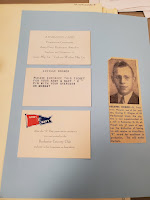Wartime Wednesday: The Army-Navy E Award
 |
| Author Photo |
In an effort to encourage the production of materials in America’s factories, the army created the Army-Navy “E” Award, an honor presented to companies whose facilities achieved “Excellence in Production (“E”) of war equipment. Also known as the Army-Navy Production Award, it was created in July 1942 by the War Department who merged the Navy “E,” Army “A,” and Army-Navy Munitions Board “Star” into a single, service-wide award.
Of the 85,000 companies involved in producing materials for the military effort, approximately fivepercent earned this prestigious award, and about half of those were bestowed on plants having less than 500 employees, considered “smaller war plants.” All factories engaged in production were eligible, as well as government facilities and contractors. Interestingly, although it was an industry award, Iowa State University received recognition for its contribution to the production of uranium for the Manhattan Project, and Dr. Harley A. Wilhelm received the award for inventing the “Ames Process” for the extraction, purification, and mass production of uranium for the Manhattan Project.
Facilities were nominated by district procurement officers, chiefs of supply services, agencies concerned with production, and the commanding officers for the Materiel Commands. Reasons for the nomination were included, and an award board reviewed the information before making a final decision. Ceremonies were conducted with an Army officer and Navy officer who presented the management team with a pennant and employees with pins. Plants that maintained an outstanding record or performance for six months after receiving their original award were given a star award, which a white star added to their pennant.
Criteria for the award included excellence in quality and quantity of production as well:
- Overcoming production obstacles
- Low rates of absenteeism
- Avoidance of work stoppages
- Maintenance of fair labor standards
- Training of additional labor forces
- Effective management
- Good record-keeping on accidents, health, sanitation, and plant protection
___________________
Will a world at war destroy a second chance at love?
Estelle Johnson promised to wait for Aubry DeLuca, but then she receives word of his debilitating injuries. Does she have the strength to stand by him in his hour of need?
Aubry DeLuca storms the beaches at Normandy, then wakes up in the hospital, his eyes bandaged. Will he regain his sight? Will the only woman he’s ever loved welcome him home or is he destined to go through life blind and alone?
Purchase Link: https://amzn.to/3MVBQnr




No comments:
Post a Comment